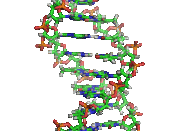Genetics
The study of genetics is an ongoing process that is constantly evolving. As new ideas are born the world of genetics broadens and becomes more specific. The way life is viewed now is significantly different then it was seventy years ago. The human genome was uncovered. From the beginning of time to the present and in the future, genetics will be a study that shall bring new discovery with each step.
The basic of genetics has to do with its composition. A gene is merely a series of DNA nucleotides in a chromosome. And a genome is all the genetic material in the chromosomes of a particular creature. The four different nucleotides of DNA vary only in their organic base. They have adenine (A), guanine (G), thymine (T), or cytosine (C). DNA is made up of three components: an organic base, a phosphate molecule, and a sugar molecule. These four are linked to each other in a "genetic code" series that scientists have just lately been able to translate.
From the beginning there were many scientists that have contributed to the study of genetics. In 1943, Avery
established that DNA bears genetic information. He even suggested that DNA might actually be the gene. Linus Pauling discovered that lots of proteins take the nature of an alpha helix, spiraled like a spring helix. In 1950, biochemist Chargaff originated that the arrangement of nitrogen bases in DNA were different, but the quantity of specific bases always occurred on a one-to-one ratio. These findings were an important element for DNA. Watson and Crick illustrated that each strand of the DNA molecule was a model for the other. These scientist's discoveries have helped new researchers with their studies in genetics.
The study of genetics has helped in solving many different questions about diseases...


